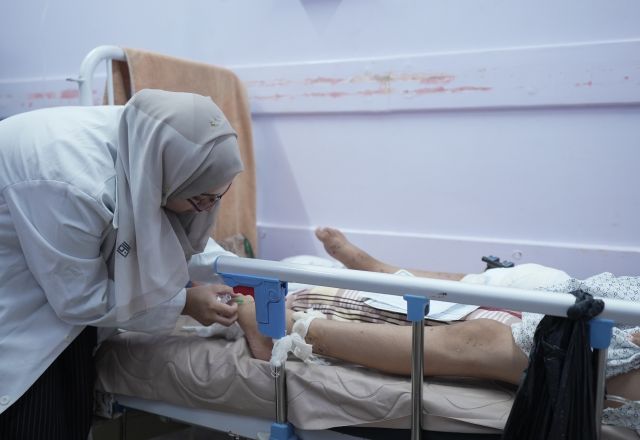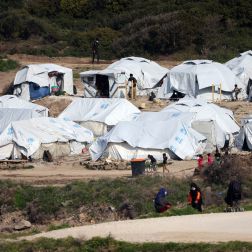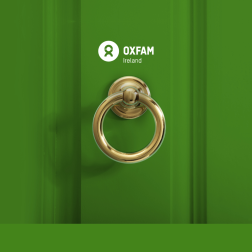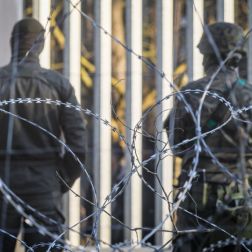
- 4 mins read time
- Published: 6th June 2024
Irish MEPs must fight back against EU plans to abandon Sustainable Development
Oxfam Ireland and our partners on the ground are responding to more and more climate change induced emergencies around the world- Southern Africa is experiencing the worst mid-season dry spell in over 100 years, further strained by the lowest mid-season rainfall in 40 years and exacerbated by the El Niño phenomenon. This has had a severe impact on the population in Southern Africa – especially for 20 million people in Malawi, Mozambique, Zambia, and Zimbabwe. The late January to early March mid-season dry spell characterized by heatwaves or heavy rains in other places - has led to the declaration of national disasters in Malawi, Zambia, and Zimbabwe as the coping capacity of affected communities, particularly around access to food, water, and livelihood, is eroded.
Moreover, there is a 60% chance of La Niña developing by June-August 2024, with a heightened risk of flooding for countries impacted by El Niño. That could result in significant humanitarian impact, especially where the resilience of affected communities has been weakened by the drought. Oxfam and our partners are also responding to ever more challenging humanitarian situations due to increase in conflict. 23 local Oxfam staff and more than 15 local partner organisations are trying their very best to keep the thin lifeline of aid trickle alive in Gaza, striving in an extremely challenging operational environment and bearing constant risks to deliver help to the devastated population of the strip.
The people we work with in the global south recognise the value of Ireland and the EU’s contribution to providing life-saving relief to the most vulnerable who are least responsible for climate breakdown and conflict in their communities. They are telling us to ask Irish candidates in the EU election to build on this essential work and continue to lead in reducing climate emissions and providing climate finance, Loss and Damage and humanitarian funding appropriate to the huge needs we are seeing on the ground. They are also asking MEPs to maintain Ireland’s and the EU’s reputation as one of the world’s largest development and humanitarian donors in the world by ensuring any future EU policy on international partnerships and development are aligned with efforts to achieve the SDGs and bolster human rights.
Moreover, they are asking MEPs to champion Women’s Rights Organizations in the majority world and increase the share of its ODA being channeled to these groups as we have seen the transformative role they play in tackling the many inequalities faced by people, especially women and girls, around the world.
However, the recently leaked draft briefing book published by the EU’s Department for International Partnerships (DG INTPA) indicates a pivot away from human-centred commitments to sustainable development, and a move towards prioritising competition, trade, and the interests of the EU to the detriment of the interests of partner countries. It indicates a disproportionate reliance on the private sector and specific industries of interest to the EU, while leaving almost no room for a deliberate sustainable development agenda, human rights, addressing inequalities, or ‘leave no one behind’ approaches.
DG INTPA is entrusted with supporting its partner countries on their path to sustainable development, reducing poverty, and promoting human rights. But its flagged future direction, if brought to fruition, risks damaging the EU’s credibility and reputation as a reliable partner and risks the achievement of the SDGs globally. This should be a major concern for Irish candidates, as this proposed change in direction does not correspond with the objectives or approach set out in Ireland’s development policy, ‘A Better World’. The proposals are also in contravention of Article 3.5 of the Treaty of the European Union (1992) and of article 208 of the Treaty on the Functioning of the European Union, which gives to EU’s development cooperation policy the primary objective of reducing poverty. We should be proud that Ireland ranks second among EU member states in terms of shares of ODA with gender equality as a policy objective (78%). This good work risks being undone by the proposed new direction by DG INTPA.
It is important to note that the most recent Dochas Worldview research published in March shows that 76% of Irish people believe it is important that the Irish Government provides overseas aid, up from 74% in 2022. This is consistent with the Eurobarometer survey from Sept 2023, where 74% of respondents agreed that tackling poverty should be one of the EU’s main priorities. A true partnership approach doesn’t only focus on the EU’s own interests (be that trade, security or migration).
Ireland’s MEPs and the EU cannot be silent on the impact of inequality and its root causes: vicious debt cycles, tax injustice and power imbalances in international fora such as the UN Security Council. And most importantly MEPs need to emphasise that climate breakdown and it’s political and social consequences is the greatest threat to our national security- faster and fairer climate action is the best defence policy we can implement.




